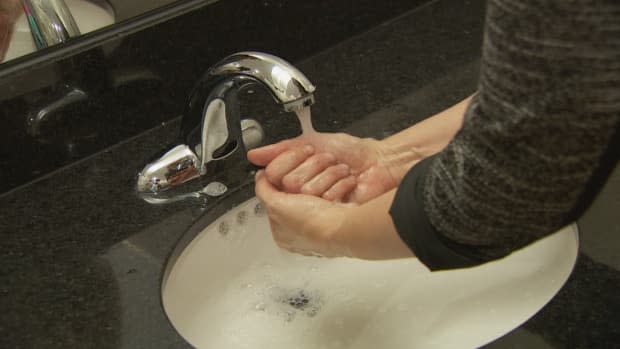How to prevent and treat 'maskne' and chapped hands during the COVID-19 pandemic

Wearing a face mask and constantly washing your hands are measures meant to protect you from COVID-19, but they can also wreak havoc on your skin.
Skin problems like acne and cracked palms can not only be irritating and painful, they also have the potential to impact a person's self-esteem and self-confidence.
To help combat the visible and invisible problems that skin issues can cause, Monica Li, a dermatologist and clinical instructor at the University of British Columbia Faculty of Medicine, offers tips to help keep zits at bay and cracks away.
"It's not a new phenomena," said Li, about mask-induced acne or "maskne" as it has been colloquially dubbed.
The medical term for it, she told CBC Tuesday, is acne mechanica, which is triggered by excess heat, friction or rubbing of the skin that irritates hair follicles. It is common for athletes like hockey players who wear helmet chin straps.
Best face forward
To help prevent pimples while wearing a mask, Li suggests using a breathable, washable mask made of 100 per cent cotton and foregoing face makeup for a tinted moisturizer or sunscreen instead.
The Public Health Agency of Canada also advises people to change their masks as soon as possible if they become damp or dirty.
To keep skin under the mask happy, Li says make sure to apply a moisturizing cream about half an hour prior to donning your mask to create a protective barrier between your face and the fabric.
She also recommends using a moisturizer every night after cleansing your face to maintain that barrier.
If problematic pimples persist, Li says there are over-the-counter treatments that can be found at your pharmacy.
If this does not help you, then she suggests talking to your physician.
Healthy hands
When it comes to keeping your hands from becoming raw and chapped, Li has a few helpful hints as well.
"Wash hands in lukewarm water," said Li, adding that a too hot or too cold temperature can strip hands of their natural moisture, something that may already be in short supply at this time of year as people spend a lot of time indoors with the heat on.

Li also suggests wearing rubber gloves while doing chores like dishes so hands are not exposed to water more than they have to be and always having a thick cream or balm on hand to put on hands.
If hands are really suffering, then she says slather them with cream, cover them with cotton gloves and let them absorb much-needed moisture overnight.
Li also wants people to always remember the importance of UV protection for both face and hands.
"Sunscreen everywhere," she said.

